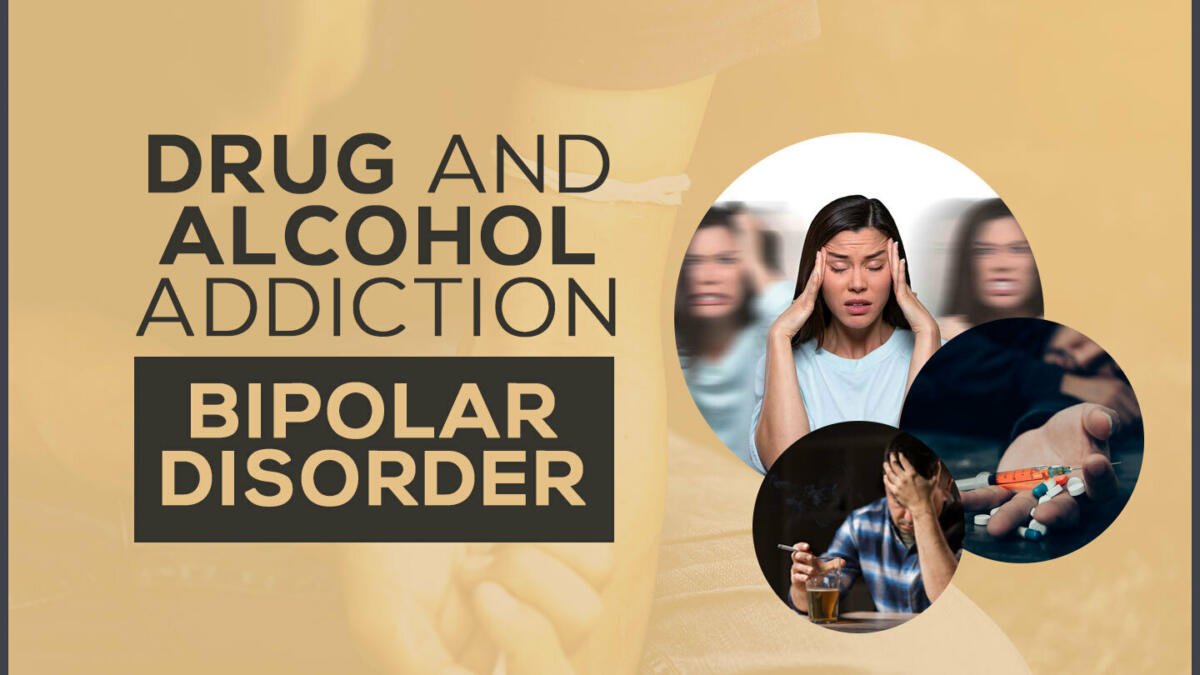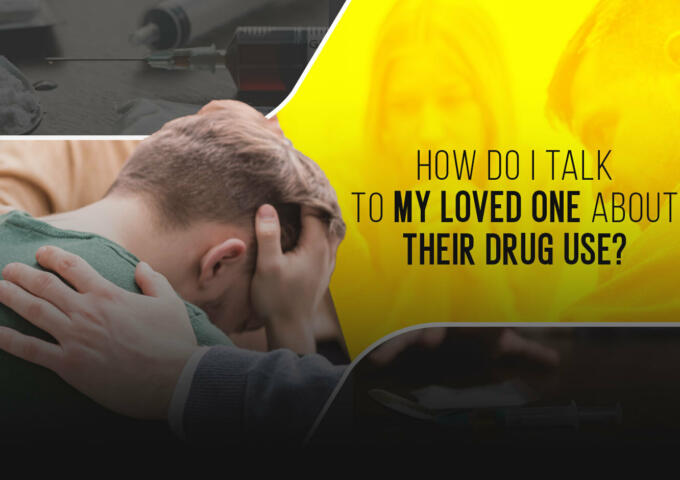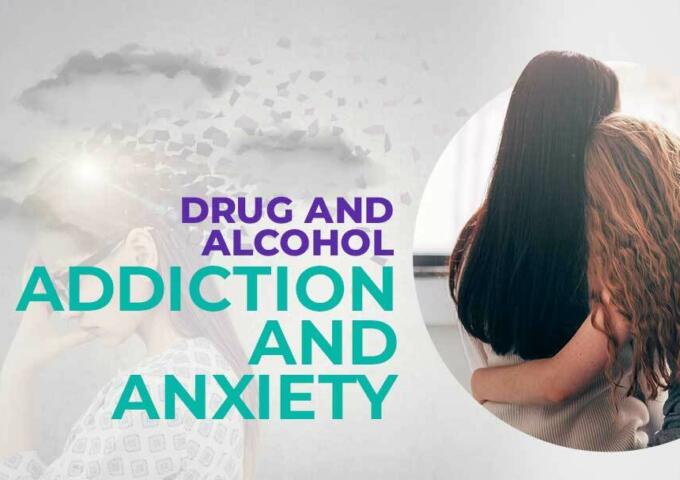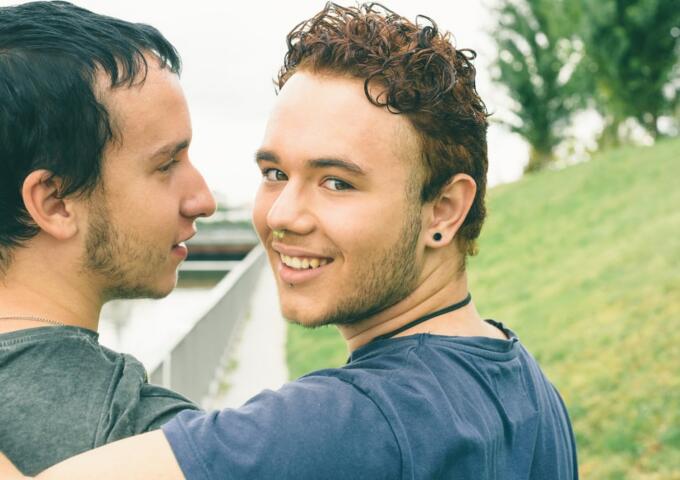Many people with drug and alcohol addiction have a co-existing mental health issue like bipolar disorder.
Bipolar disorder, although not as common as depression and anxiety, is known to affect millions of people across the country. While bipolar disorder is typically thought of as manifesting in intense mood swings, that is only the case with some sufferers. Bipolar disorder is actually defined by periods of mania or hypomania followed by periods of feelings of depression.
A CDC study of bipolar disorder revealed that approximately 58% of people with the condition had a history of substance abuse. and some studies have found that even higher percentages will have a history of substance abuse, especially alcohol, at some point in their lives.
In this article, we’ll take a closer look at the relationship between bipolar disorder and drug and alcohol addiction and how the two serious conditions affect each other.
If you or someone you love are struggling with bipolar disorder and drug and alcohol addiction, consider contacting an online therapist.
What Is Bipolar Disorder
Originally called manic depression, bipolar disorder is a mental health disorder known to cause swings characterized by emotional highs (hypomania or mania) and lows (depression).
When you hit an emotional low, you may feel hopeless, sad, and even lose interest or pleasure in a variety of activities that were once of interest. In a similar fashion, an episode of bipolar disorder can swing to the euphoric or dysphoric, highly energetic side and leave you feeling full of life and excited about everything. It is at this stage that feelings of irritability crop up, which can even develop into aggressiveness.
The problem, however, is that the moods can abruptly switch from mania to depression, which can have adverse effects on your day-to-day activities. Bipolar disorder can affect an individual’s sleep patterns, judgment, behavior, energy levels, and ability to execute basic tasks.
Unfortunately, bipolar disorder is a lifelong mental health condition that, although not curable, can be controlled through medication and consistent therapy.
Types of Bipolar Episodes
Manic Episodes
Manic episodes are usually severe and tend to last for more than a week. Patients in this phase are usually highly energetic and agitated, This is often excessively cheerful or, on some occasions, hostile and aggressive. Hospitalization is sometimes required for patients in this phase, which may include patients losing some ability to think normally
Hypomanic Episodes
Hypomanic episodes are usually less severe than manic episodes and tend to last for around 3-4 days. Hospitalization is not always necessary for hypomanic episodes but is recommended in some cases.
Major Depressive Episodes
Major depressive episodes usually leave people uninterested in activities or depressed for at least 2 weeks. The episodes can go away on their own but must last for a minimum of 2 weeks to be clinically defined as an episode.
Mixed Episodes
It’s common for people with bipolar disorders to have mixed episodes that manifest as hypomanic, major depressive, or manic. These episodes must occur repeatedly to be classified as bipolar disorder.
Types of Bipolar Disorder
The National Alliance on Mental Illness categorizes bipolar disorders into 4 main types, as explained below.
Bipolar I
Bipolar I disorder is arguably the most well-known of the 4 types and is characterized by the occurrence of several manic episodes with (or without) depressive episodes.
However, for the disorder to be categorized as Bipolar I, the euphoric (manic) episodes must be severe enough to the extent of hospitalization. The hospitalization usually lasts for a week or longer.
In some instances, Bipolar I may trigger psychosis, which is a short or prolonged break from reality.
While it’s not a must for a depressive episode to manifest in Bipolar I, the manic episode must be intense and prolonged for a patient to be diagnosed with the condition.
Bipolar II Disorder
Patients are diagnosed with Bipolar II disorder when they’ve had at least one major depressive episode and hypomanic episodes.
However, patients with Bipolar II have never experienced a manic episode, which means they’re less likely to be out of touch with reality when diagnosed with this condition.
Cyclothymic Disorder
Also called cyclothymia, cyclothymic disorder is characterized by repeated mood shifts between hypomanic and depressive episodes that persist for well over two years. However, the mania and depressive episodes are not significant enough to be diagnosed as bipolar disorder.
The individual may have episodes of good moods, although they tend to last for less than 8 weeks.
Unspecified Bipolar Disorder
This complex category involves mood disorders induced by other conditions such as addiction or chronic illnesses. If not controlled early enough, this disorder can lead to severe consequences.
Contact an online therapist to find out more about bipolar disorder and drug and alcohol addiction.
Can Bipolar Disorder Lead to Drug and Alcohol Addiction?
Although bipolar disorder is not directly related to addiction, it is known to increase the chances of developing chemical dependencies if not managed well enough.
Here are some of the ways bipolar disorder can lead to addiction.
Impulsive Behavior
The fluctuating mood swings triggered by the condition more often than not increase impulsivity. During manic episodes, individuals tend to experience an influx of thoughts that significantly increase the chances of taking impulsive actions. Additionally, manic episodes are characterized by decreased ability to perceive risk and a lack of impulse control.
If the manic episodes are not controlled, an individual might be tempted to consume drugs in the heat of the moment without paying much attention to the potential consequences.
Moreover, the inflated self-confidence that results from a manic episode might wrongly incite an individual to partake in potentially addictive behavior, thinking that they can’t be affected by drugs or alcohol or believing that the negative consequences won’t happen to them.
Self Medication to Control Symptoms
Living with bipolar disorder is anything but easy. Individuals diagnosed with the mental illness often find it hard to lead normal lives, especially when the symptoms become severe.
To cope with the symptoms, a large number of people with bipolar disorder resort to self-medication, which is often through drug or alcohol abuse. This explains why some people have specific go-to drugs to lift them during depressive episodes and maintain (or reduce) their high during manic episodes.
For instance, many people with bipolar disorder are known to resort to stimulants to boost their moods during depressive episodes. Sedatives are also commonly used as a form of distraction from feelings of hopelessness and depression.
On the other hand, bipolar people often turn to substances like cocaine or amphetamines to maintain their high energy levels and excitement. Others can rely on downers like sedatives or alcohol to calm their episodes and achieve some balance.
No matter the use of drugs, self-medication is ill-advised as it can lead to chronic addiction.
As a result, it is important to seek professional assistance to learn how to manage and live with the episodes associated with bipolar disorder. Failure to handle the symptoms well increases the chances of self-medication, which ends up in addiction in most cases.
Symptoms of Bipolar Disorder to be On the Lookout For
Bipolar symptoms usually fall into two main categories, manic or depressive episodes. These episodes tend to come with their distinct symptoms, as explained below.
Manic Episodes
During manic episodes, individuals often feel extremely energetic and happy. They might also come off as extremely confident to the extent of arrogance.
Here are some of the common symptoms of manic episodes.
More energy than normal: A manic episode is often characterized by excessive energy and jumpiness. The hyperactivity usually lasts for several days to even weeks and can lead to psychosis.
Racing thoughts: People with bipolar disorders usually have exaggerated thoughts that are all over the place. These thoughts can have negative consequences if actualized, exactly why there’s a need to treat the condition as early as possible.
Decreased sleep: If a loved one is extremely energetic, has abnormal thoughts that are all over the place, and doesn’t have a regular sleep pattern, chances are you’re dealing with manic episodes.
Feelings of self Importance and invincibility: Manic episodes are usually accompanied by feelings of invincibility, power, and self-importance. People struggling with these episodes can be tempted to indulge in risky behavior in the thought that they won’t get affected.
High appetite for pleasurable (and potentially risky) activities: You’ll know a loved one is experiencing intense manic episodes if they have an insatiable urge to engage in pleasurable activities like shopping, eating, drinking, sex, and other potentially risky behaviors.
Depressive Episode
When experiencing a depressive episode, people often feel indifferent, hopeless, and sad. It’s also normal for people to have extremely low energy levels and feel fatigued.
Below are common symptoms of depressive episodes.
Feeling extremely low spirited (for a prolonged period): Although it’s normal to feel low, experiencing extremely low moods for prolonged periods is usually an indication of a depressive episode.
Disinterest in almost all activities: Another sign of a depressive episode is disinterest in day-to-day activities or hobbies. An individual experiencing a depressive episode might even get aggressive when forced to perform basic tasks like self-hygiene.
Feeling worthless and hopeless: You’ll also know that a loved one is dealing with a depressive phase if they appear hopeless. Most people in this phase don’t view themselves as worthy of life or family and might even develop suicidal thoughts.
Isolation: It’s common for people experiencing a depressive phase to want to isolate and distance themselves from everything. While it’s totally okay for a loved one to detach from friends and family for a day or two, prolonging the isolation might signal the worsening of the condition and thus the need for professional intervention.
Sleep irregularities: Another sign of a depressive episode is disoriented sleep patterns. Some people can start sleeping too much or waking up at weird hours, while others might struggle to catch some sleep.
Concentration difficulties: People struggling with a depressive episode will often find it hard to concentrate and even make important decisions. This is usually followed by poor work or school performance.
The frequency of mood episodes usually depends on the severity of the disorder. And to avoid dealing with chronic bipolar disorder that leads to psychotic behavior, it’s best to seek addiction treatment as soon as possible.
Treating Drug and Alcohol Addiction and Bipolar Addiction
Treating co-occurring disorders is possible as long as attention is given to both the addiction and the underlying mental issues.
Fortunately, doctors use therapy and medications to treat these co-occurring disorders and help patients reclaim their lives.
For more information on treating drug and alcohol addiction and bipolar disorder, reach out to an online therapist.
Medications for Drug and Alcohol Addiction and Bipolar Disorder
Medication-assisted treatment (MAT) is a big part of addiction treatment and is offered in a large variety of facilities.
Several FDA-approved medications can be prescribed for addictions like alcohol and opioids, which besides minimizing withdrawal symptoms, can also help ease cravings.
Similarly, there are a variety of medications that can be used to treat bipolar disorders while patients receive addiction treatment.
Below are some of the commonly used drugs in treating bipolar disorders.
- Antipsychotics
- Anticonvulsants
- Benzodiazepines
- Lithium
Although effective in treating withdrawal symptoms and manic episodes, benzodiazepines can become easily addictive and should thus be prescribed with caution.
Therapy for Drug and Alcohol Addiction and Bipolar Disorder
Therapy is usually used in treating addiction and co-occurring mental illnesses. The most commonly used type of therapy is cognitive-behavioral therapy (CBT), which addresses the feelings and thoughts that people with these underlying conditions face.
However, a therapist might choose to combine a variety of behavioral therapies to treat both an addiction and a co-occurring disorder.
Inpatient Vs. Outpatient Treatment: Which Is Better?
If you’ve never received treatment for a mental condition or an addiction, it might be hard to know where to start and the type of facility to enroll in. However, with the right type of information, you can make the right choice that suits you (or a loved one).
Let’s take a quick look at both options.
Inpatient Rehab for Drug and Alcohol Addiction and Bipolar Disorder
Inpatient rehabs are ideal for treating chronic addictions and co-occurring disorders. These rehabs provide both short and long-term addiction treatment services and usually combine a variety of behavioral therapies and experiential therapies.
Additionally, patients enrolled in inpatient rehabs have unlimited access to facility-specific amenities, which adds to the overall quality of treatment. You (or a loved one) will also enjoy recovering in serene, well-secluded environments that are ideal for addiction and mental health treatment.
Outpatient Rehab for Drug and Alcohol Addiction and Bipolar Disorder
Although not as intense as inpatient rehabs, outpatient rehab centers are usually great options for patients in the advanced stages of rehabilitation.
Outpatient rehabs don’t require patients to reside in the facilities, meaning you (or a loved one) will be receiving treatment from home or a sober living home.
This type of program can be short-term or long term depending on the type of addiction. However, it is not recommended to kickstart addiction treatment in an outpatient facility, especially if you have a long history of bipolar disorder and an underlying addiction.
Get Help for Bipolar Disorder and Drug and Alcohol Addiction
If you or someone you know is struggling with addiction and bipolar disorder, then it’s best to seek professional assistance without any delay.
Although common, co-occurring disorders require medication and therapy to treat, especially if you want to achieve long-term sobriety.
Contact a rehab today to learn more about the services offered and how soon you can kickstart your journey to recovery.
You can also try reaching out to an online therapist.






Leave a Reply